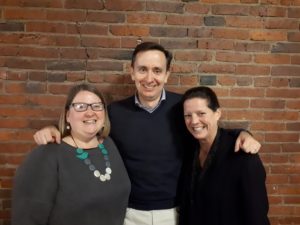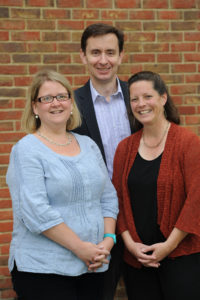 On Wednesday I flew via New York City (sorry for the slightly hazy ‘through the plane window’ picture of NYC at night), to Pittsburgh, Pennslyvania, for the POD Conference. This is a conference I’ve always been keen to attend – it’s one of the main conferences for US academic developers – similar to the Staff and Educational Development Association (SEDA) in the UK, and both POD and SEDA are members of the International Consortium for Educational Development (ICED) which has a conference every 2 years. POD is big, and this year they reached the heady heights of 1200 delegates. It was incredibly refreshing to only know a handful of people at POD. At many conferences it’s wonderful to catch up with colleagues I know, but there is something exciting in meeting new people and hearing about new practices in universities across the US. I’ll mention a few highlights.
On Wednesday I flew via New York City (sorry for the slightly hazy ‘through the plane window’ picture of NYC at night), to Pittsburgh, Pennslyvania, for the POD Conference. This is a conference I’ve always been keen to attend – it’s one of the main conferences for US academic developers – similar to the Staff and Educational Development Association (SEDA) in the UK, and both POD and SEDA are members of the International Consortium for Educational Development (ICED) which has a conference every 2 years. POD is big, and this year they reached the heady heights of 1200 delegates. It was incredibly refreshing to only know a handful of people at POD. At many conferences it’s wonderful to catch up with colleagues I know, but there is something exciting in meeting new people and hearing about new practices in universities across the US. I’ll mention a few highlights.

I attended a session by Emily Gravett, James Madison University, Virginia and Kristin Rudenga, University of Notre Dame, Indiana, entitled Imposter phenomenon in educational developers. It might not be a surprise that the session was very well attended! They defined the features of IP as believing: that you have fooled others into overestimating one’s ability; personal success has been due to luck or an evaluator’s misjudgment; and you will be exposed. They had undertaken a survey of POD members and found that 96% of those surveyed had experienced IP at some point. Importantly, the presenters and audience suggested a range of mechanisms to help overcome IP:
- Accept tasks won’t be done perfectly
- Focus on strengths
- Review your experience and achievements
- Talk with a safe person outside your professional network
- Get comfortable improvising
- Rehearse acting confident
- Shift the focus of self-talk to focus on effort and achievement not work
- Observe and improve self-language
- Ensure you include self-care in terms of health and exercise
- Find supportive networks
The slides from this event are available if you are interested.
Another good session was one given by Katie Walsh from Carnegie Mellon University, Pittsburgh and Heather Dwyer, Tufts University, Massachusetts entitled Engaging faculty with the research behind evidence-based practice. They have spent some time and effort translating some key educational research articles into either one page summaries or into interactive summaries, which they use in professional development workshops to get faculty to analyse data or outcomes from the research to predict outcomes or critique the findings and consider how they can be used in their own practice. I am sure we can use these ideas back at the Institute for Academic Development in Edinburgh.
Finally, another session I found helpful was the one from Kris Knorr and Rebecca Taylor from McMaster University, Canada entitled If you build it will they come? This was a critique of the literature and their own practice on the difference between the numbers of faculty signing up to attend workshops and the numbers actually attending. They gave a great overview of many of the reasons for this drop off in attendance including: no time; competing priorities; perception of no need for teaching development; lack of belief that educational development would lead to change; teaching is not valued or evaluated; and psychosocial risks. Colleagues in the group shared a range of similar experiences and then ideas for how we overcome these challenges: build it into promotion criteria; invite external experts; try to align events with interests and needs; email reminders (particularly sent to individual person by name); phone calls one week prior for particularly important events; food!; create a certificate if it is a series of events; invitation from the Chair or Dean to attend; co-present with someone from the Dept where the workshop is taking place; consider charging for no shows; piggy back the event on the back of an existing event staff are already attending; ensure events are contained in any central calendar of events; develop 15-20 minute educational development nuggets that can be given at departmental meetings; ensure the topics are relevant and clearly described.
The conference was also a great excuse to have dinner with Peter Felten and Alison Cook-Sather who were co-authors with me on Engaging students as partners in learning and teaching: a guide for faculty, which was published in 2014. Allan, my husband took a picture of the three of us in 2013, so we thought we’d recreate the photo for 2019. See if you can spot which is which! One taken by a professional photographer and one not 😉 and one where we were all younger – and in my case slimmer! 🙂




